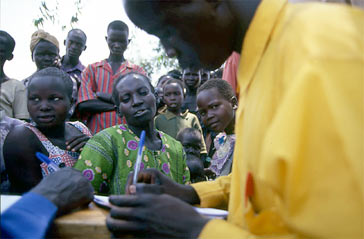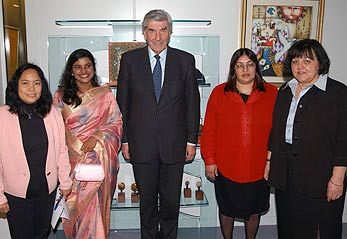Governments reaffirm their commitment to 1951 Convention
Governments reaffirm their commitment to 1951 Convention

GENEVA, Dec. 13 (UNHCR) - An unprecedented meeting of more than 150 countries Thursday reaffirmed the ideals of the 1951 Refugee Convention that for a half century has helped millions of people survive wars and repression, but which in recent years has come under increasing political attack.
A declaration adopted at the two-day ministerial conference, jointly hosted by UNHCR and the Swiss government, called for stronger protection of refugees and asylum seekers at a time when uprooted people were increasingly being associated with criminals and terrorists. And it hailed the 'relevance and resilience' and the 'enduring importance' of the 1951 treaty.
"It's time to speak of refugees not only as a burden or as miserable people but to see them as potential valuable citizens," High Commissioner Ruud Lubbers told a news conference. "We must change the way we look at refugees."
He said the reaffirmation of the document's goals should be seen as an agenda for future action, adding that the Convention should be placed on the same level as the Universal Declaration of Human Rights. The goal now, he said, was to address the root causes of migration flows, but conceded "This will take quite some time. We have to live with the phenomenon that each year there will be another incident, another tragedy, another civil war."
The conference and the declaration commemorated both the treaty's past achievements and explored new problems - including massive migration, the increase in smuggling people for profit, protracted exile, and the increasingly hazy line between migration and asylum - that have emerged since the Convention was adopted 50 years ago.
Though a total of 156 nations attended the meeting, the declaration itself was adopted by the 126 countries present who have acceded to the Convention and/or its 1967 Protocol.
Dramatic change
The meeting took place in a political context dramatically altered by the September 11 attacks in the United States with many countries tightening their security and immigration policies and a growing tendency to link asylum seekers with criminals and terrorists.
The conference was part of a process called Global Consultations on International Protection which UNHCR launched at the start of 2001 involving governments, non-governmental organisations, academics, judges and other experts. The Consultations will end in mid-2002 with the adoption of an Agenda for Protection which capitals and humanitarian groups will use to strengthen worldwide refugee protection.
Some critics have said the Convention has become irrelevant in a world that has become infinitely more complex since it was drawn up. Others said the Convention is unlikely to remain viable unless a solution can be found to the problems of mixed migration and failed asylum applicants are returned to their countries of origin.
But Lubbers insisted "The Convention will go on, from there we can try to improve the policies. The problem is not the Convention; the Convention is the solution." He added, "Australia has alerted the world that there is a risk of becoming too restrictive" - a reference to that country's controversial decision to turn back boatloads of would be asylum seekers.
Though some governments have paid mere lip service to the Convention, the Geneva declaration affirmed nations "commitments to implement our obligations under the 1951 Convention and /or its 1967 Protocol fully and effectively."
Several recommendations
It contained recommendations encouraging countries that have not yet done so, to accede to the Convention, adopt national refugee legislation and to be particularly careful because of the current tense political climate in applying articles in the treaty covering the exclusion of persons suspected of committing serious crimes.
UNHCR was recognised as the "multilateral institution with the mandate to provide international protection to refugees", and governments were encouraged to both strengthen their cooperation with the organisation and "respond promptly, predictably and adequately" to its funding needs.
The declaration emphasised that the principle of the non-forcible return of asylum seekers (refoulement) was sacrosanct. It said 'prevention' of crises was the best way to avoid future refugee problems, and that while states should search for permanent solutions for uprooted peoples, especially voluntary repatriation, they should also continue to help particularly vulnerable people to integrate or resettle in new countries.
In a statement read to the conference, UN Secretary General Kofi Annan said there was a tendency to equate refugees "at best with economic migrants, and at worst with cheats, criminals, or even terrorists. We must refute this gross calumny," Annan said. "Refugees are not criminals. They are victims of autocratic or abusive regimes, of conflict, and of criminal smuggling rings."
As if to prove the point, the conference heard from Ms. Vaira Vike-Freiberga, the President of Latvia and a former refugee.
"Three weeks and three days after my family left the shores of Latvia, my little sister died. We buried her by the roadside, we were never able to return or put a flower on her grave," she said. "And I like to think that I stand here today as a survivor who speaks for all those who died by the roadside, some buried by their families and others not."





